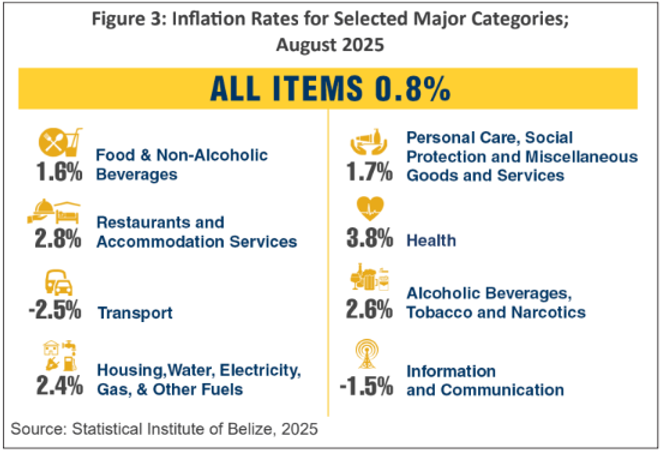In August 2025, Belizeans experienced a mixed economic landscape as rising costs in essential sectors like food, housing, and liquefied petroleum gas (LPG) were partially offset by declining fuel prices, resulting in an overall inflation rate of 0.8 percent compared to the previous year. According to the Statistical Institute of Belize, the Consumer Price Index (CPI) rose to 120.7, up from 119.7 in August 2024. The most significant contributors to this increase were the ‘Housing, Water, Electricity, Gas and Other Fuels’ category, which surged by 2.4 percent, and ‘Food and Non-Alcoholic Beverages,’ which climbed by 1.6 percent. Together, these categories represent nearly half of household expenditures, amplifying their impact on consumers. Housing costs were driven by a $12.24 year-over-year increase in the price of a hundred-pound LPG cylinder, reaching $130.04, alongside a 1.7 percent rise in home rental prices. Food inflation was fueled by higher prices for bread, bakery products, and meats, with beef steak and chicken breast prices soaring by 10.7 and 8.5 percent, respectively. Non-alcoholic beverages also saw a 4.4 percent increase, primarily due to higher costs for purified water, juices, and soft drinks. Additional notable price hikes included health services (up 3.8 percent), restaurants and accommodation (up 2.8 percent), and personal care items like deodorants and lotions (up 1.7 percent). Alcoholic beverages and tobacco rose by 2.6 percent, led by cigarette prices. However, these increases were partially mitigated by a 2.5 percent decline in transport costs, driven by lower gasoline and diesel prices. Regular gasoline dropped by $0.90 per gallon, diesel by $0.67, and premium gasoline by $0.62. Information and communication costs also fell by 1.5 percent, reflecting cheaper cell phones. Inflation varied significantly across municipalities, with Punta Gorda experiencing the steepest rise at 2.7 percent due to broad-based increases in food, LPG, and personal care items. In contrast, Orange Walk recorded a slight decline of -0.2 percent, benefiting from lower fuel, garment, and vegetable prices. Month-to-month, consumer prices increased by 0.2 percent between July and August 2025, primarily due to higher diesel, vehicle, and restaurant costs. Year-to-date inflation for the first eight months of 2025 stood at 1.3 percent, largely influenced by rising food, housing, and personal care expenses, while transport and communication costs trended downward.
